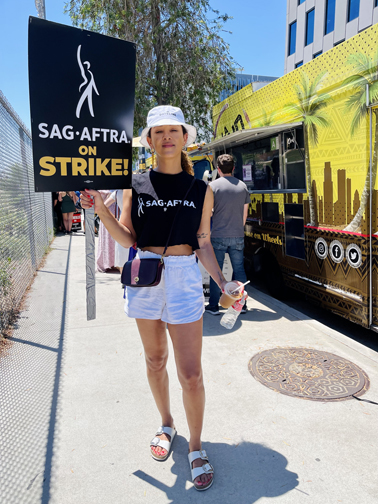
By Lynn SHER
“They changed the business model and left us behind!” – SAG-AFTRA
Members of the Screen Actors Guild – American Federation of Television and Radio Artists (SAG-AFTRA) went on strike after talks with the studios stalled.
In the blazing afternoon heat of a typical Los Angeles summer, the streets surrounding Netflix headquarters in Hollywood uncharacteristically teamed with people. Members of SAG-AFTRA officially went on strike on Friday, July 14 when contract negotiations with the Alliance of Motion Picture and Television Producers (AMPTP) reached an impasse and members of both SAG-AFTRA and the Writers Guild of America (WGA) took to the streets, joining forces to protest many items of contention. (See a review of the negotiations at https://www.sagaftra.org.)
This is a revolutionary time for the entertainment industry. It’s the first time since 1960 that both unions have gone on strike at the same time; the last actors’ strike was in 1980. Both Guilds are dealing with similar issues and are receiving equal pushback from the AMPTP. Streaming platforms have significantly lessened the actors’ and writers’ income in a myriad of ways, particularly in residual payments, while it is claimed that the salaries of CEOs have grown astronomically and studios want to use AI (artificial intelligence) in ways that undermine the integrity of the members in both unions.
Frances Fisher, veteran actor and SAG member since 1976, has been on the SAG-AFTRA board locally and nationally for 23 years and is a member of the negotiating committee. She believes the AMPTP systematically stymied the negotiations in order to buy time so it could have proper releases for the summer blockbusters before the imminent strike.
She said, “[The AMPTP] stalled with getting back proposals in a very untimely fashion … we basically spent six out of the 12 days waiting.”
Now that a significant amount of acting work is in the streaming realm, SAG-AFTRA argues that an entire overhaul of past contracts is needed. Fran Drescher, SAG’s current president, believes these increased wages must come from the money producers and CEOs are making from subscription profits.
“The business model has changed and the old contract no longer can be negotiated in a way that will give … the performers their due,” Drescher said adding, “[Streaming] has disemboweled the old business model.”
Fisher agreed, saying, “They have to be aware that they changed the business model and left us behind.”
In deliberations, Duncan Crabtree-Ireland, the negotiating board’s chief negotiator and the chief operating officer and general counsel of SAG-AFTRA, found some hidden legal vernacular that could be detrimental specifically to background actors – something that could eventually make them obsolete.
Fisher explained, “[On] condition of employment, a background actor has to sign away their right and their likeness … for a half a day’s wages. [The studios] can use that likeness, that digital replica … anytime they want, throughout the universe, in perpetuity.”
Actors’ have said they are worried about this and want clear regulations and protections for themselves with their new contract; however, the AMPTP would not concede. The AMPTP represents entertainment conglomerates like Amazon/MGM, Apple, Disney/ABC/ Fox, NBCUniversal, Netflix, Paramount/CBS, Sony, Warner Bros. Discovery (HBO), among others. AMPTP members have responded to the strike saying, “The AMPTP’s goal from day one has been to come to a mutually beneficial agreement with SAG-AFTRA. A strike is not the outcome we wanted. For SAG-AFTRA to assert that we have not been responsive to the needs of its membership is disingenuous at best.”
Bob Iger, CEO of Disney, said, “There’s a level of expectation that they have that’s just not realistic.”
Drescher responded to his statement by pointing out that he makes $78,000 a day and receives a $20,000,000 bonus each year.
“He’s the last person [that should be talking] about what’s realistic,” she said. “Wake up and smell the coffee. The jig is up.”
